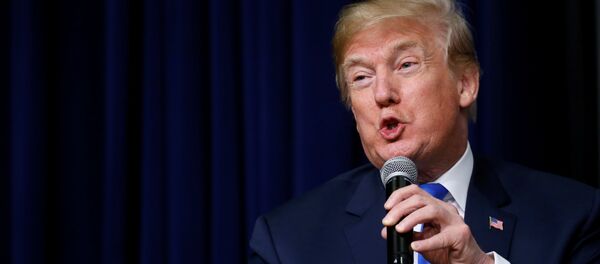Last week, Trump revealed that the United State would soon withdraw from Syria. However, there was no confirmation from the president's administration or the Pentagon. On Tuesday, Trump reiterated his stance, adding that these plans will be discussed with coalitions' allies and countries of the region.
Syria's Envoy to the United Nations Bashar Jaafari said that Damascus had not received any official information on Trump's plans to pull out US forces from the country.
Political commentator and historian Dan Lazare said the president’s own shortcomings explained why he lacked confidence to override and master the US military bureaucracy.
"Trump lacks any capacity for strategic thinking whatsoever," Lazare said. "He has no concept of the forces that drew the United States into Syria in the first place and are now pressuring it to stay."
However, "For all his bluster, Trump is crippled by his own weakness… He's a minority president, someone who lost the popular election by nearly three million votes and slipped into office only by virtue of a constitutional fluke," he said.
Washington's two key allies, Israel and Saudi Arabia, wanted Assad out for years, as did the long-established war hawks in the United States, but their long-attempted schemes were now backfiring, Lazare pointed out.
"Given Assad's unwillingness to go quietly into that good night, the [US war hawks] are now terrified that Iran and Russia are reaping the benefits of their own miscalculations," he said.
Israel and Saudi Arabia both got on well with Russia, but remained terrified of Iran, Lazare commented.
"Putin is not the bugaboo in Riyadh or Tel Aviv that he is in Washington. But all three agree that an Iranian resurgence is intolerable and all are therefore dead set on the US remaining [in the region]," he said.
TRUMP NEEDS TO PRODUCE CLEAR PLAN FOR US TO EXIT SYRIA
It was not enough to merely publicly state that the United States should and eventually would militarily withdraw its forces from Syria, as Trump had now done, Lazare explained.
"Muttering, ‘We'll be coming out of Syria, like, very soon,’ is not enough. Trump needs a plan for getting out, one that entails pushing back against Israel, the Saudis, the Washington foreign-policy establishment, and the so-called ‘intelligence community,’" he said.
To achieve that, the US president would have to stand up to powerful lobbies at home and, in the process, hammer out a new working relationship with Russia, Syria, and Iran, Lazare observed.
This lack of foreign policy experience, expertise and confidence meant that Trump had tied himself up in knots before the Democrats even uttered a word on his Middle East policies, Lazare remarked.
"Foreign policy-wise, the guy can't tie his own shoelaces. So his opponents have no problem bending him to their will," he said.
All these factors meant that, regardless of Trump’s public statements and assurance, the United States would not be withdrawing its military forces from Syria, Lazare assessed.
"Bottom line: Nothing will change. Despite occasional protests to the contrary, Trump will maintain the US presence in Syria for as long as anyone can see," he concluded.
TRUMP BACKED DOWN IN FACE OF ‘SOFT COUP’ BY DISLOYAL OFFICIALS
President Trump had backed down in the face of open defiance by his own officials, a condition that amounted to a "soft coup," retired professor of neurology and political commentator John Walsh observed.
"Shockingly, the military and officials at the State Department contradicted him without consulting him: That is insubordination — at the least," Walsh said. "Now, Trump has backed down: So what we see here is in fact a soft coup."
Trump was not in charge of the US military apparatus in real terms, Walsh pointed out.
"The President is not calling the shots; he is not obeyed… All this is crystal clear — there is no reason to concoct convoluted theories about it," he said.
Trump sincerely wanted to withdraw all US forces from their ongoing commitment to fighting unending wars across the Middle East, Walsh stated.
"It is clear that Trump wants out of wars in the Middle East. He has said so repeatedly, most recently in Ohio, lamenting that we wasted a trillion dollars on these wars (an underestimate) instead of curing the infrastructure problems in the United States. … That sentiment appeals to his core base," Walsh said.
"We are likely to see false flag chemical weapons attacks or similar ploys to force Trump back in. [New National Security Adviser John] Bolton's arrival is only likely to make things worse," Walsh said.
The so-called peace movement forces within the United States had let their cause down by failing to come out in support of Trump’s call for a pullout from Syria, Walsh pointed out.
"[O]n his call for withdrawal from Syria, the peace movement has not supported him. The silence, with a few exceptions, is deafening — much the same silence that greets his attempts to develop a new Detente with President Putin," Walsh said.
Trump's failure to win the day in getting out of Syria must be attributed to the lack of support he has for it, Walsh maintained.
"The peace movement has failed miserably in that respect. It shares the blame for the failure to leave Syria. It is a matter of great shame," he said.
Some 2,000 US servicemen are currently employed in Syria, according to reports.




